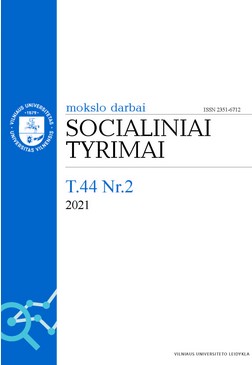Strateginių pokyčių valdymas savivaldybės viešojoje bibliotekoje
The Management of Strategic Change in the Municipal Public Library
Author(s): Laima Liukinevičienė, Kamilė KuodytėSubject(s): Library operations and management, Public Administration, Management and complex organizations
Published by: Vilniaus Universiteto Leidykla
Keywords: strategic change; strategic change management; municipal public library;
Summary/Abstract: Public libraries, which are undergoing technological and socio-cultural changes, today become centres of socialization of communities, creating social and cultural well-being, therefore, their effective management becomes the object of research. This is also relevant in the implementation of public policy: strategic documents (“Europe 2030”, “Lithuania 2030”), which guide public sector bodies to achieve a sustainable economy, also actualize the ability to anticipate the necessary changes in the organization. In addition to the usual long-term strategic goals (providing high-quality various services, programs, resources to people of all ages; developing existing collections; creating an environment that responds to community needs and promotes creativity), municipal libraries aim to strengthen the institution’s management and develop local communities. Due to COVID-19, the revised strategic plans of public libraries of the Republic of Lithuania have made the accessibility aspect of services even more relevant. Long-term goals testify to the need for strategic change, at the same time raise the problematic questions: what are the essential aspects of science in the management of strategic change in the municipal public library? What is the situation of strategic change management in Lithuanian municipal public libraries? The research aims to practically investigate the situation of strategic change management in Lithuanian municipal public libraries and to discern the aspects to be improved. Based on the scientific literature, we define strategic change as significant fundamental changes in the organization aimed at positive change: to eliminate shortcomings, negative consequences and take on new challenges inherent in the organization’s strategy. They are always linked to the strategic goals of the organization, are changing or touching the entire organization, requiring strategic and change management competencies. The strategic changes implemented in the libraries of the Republic of Lithuania in this decade are more attributable to adaptation or evolution, as there are changes in sustainable growth. According to the hierarchical structural model, strategic administrative (changes in management structures, processes) or strategic functional changes (e.g. changes in personnel, financial management strategy, etc.) are usually initiated in the municipal public libraries themselves. Strategic political and strategic changes in work are mainly driven by politicians. Strategic change requires leadership at all levels of an organization’s governance and is generally seen as a significant factor in increasing employees’ commitment to change. The management of strategic change in libraries as a process has much in common with the management of strategic change in other public sector institutions. Their management in libraries is influenced by external and internal factors, in particular public policy. Among the internal factors for municipal public libraries, the process of managing changes, in general, is important, as it was common practice in Lithuanian municipalities to work in accordance with the municipal cultural policy strategy without developing a separate strategy for the development of their own, separate institution. In the current context of increasing decentralization of governance, it is increasingly the responsibility of libraries to take the initiative and take care of the long-term goals of the organization. The public libraries of two neighbouring municipalities (Akmenė district and Mažeikiai district) were selected for the research, a strategy of mixed methods was applied, combining qualitative research methods (content analysis of documents) and quantitative research methods (total questionnaire survey of both library employees except director and deputy director using apklausa.lt, after receiving participants’ consent via e-mails).
Journal: Socialiniai tyrimai
- Issue Year: 44/2021
- Issue No: 2
- Page Range: 61-83
- Page Count: 23
- Language: Lithuanian

